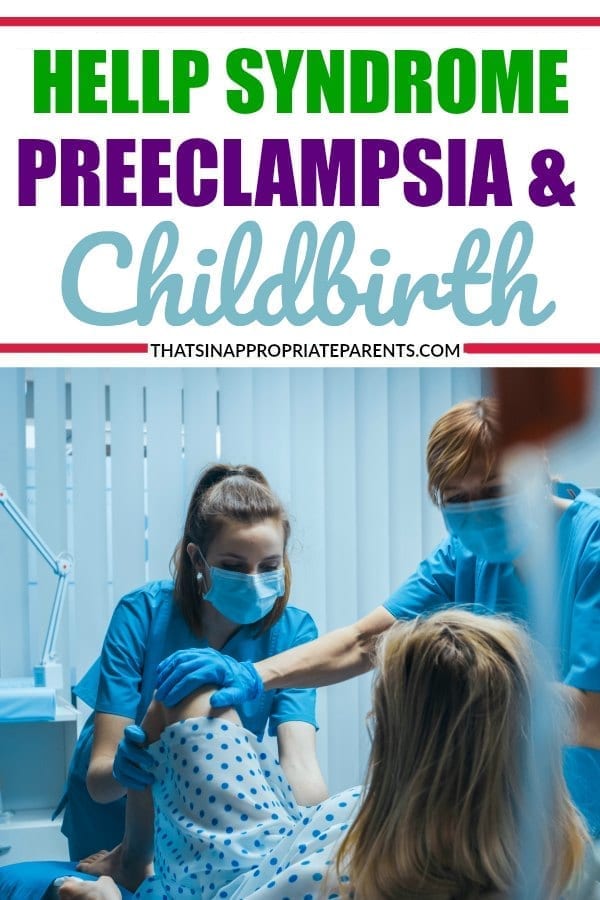Recently after turning on Netflix and watching an episode of Grey’s Anatomy, instead of escaping, I found myself reliving the trauma of almost dying while giving birth.
As soon as the postpartum mom on the show complained of excruciating pain in her upper abdomen, I was instantly transported back to my own labor and delivery room.
“It hurts,” I said as soon as I could stop vomiting into the grocery bag my husband brought along as he escorted my 36-week belly into the room at L&D. “Like someone stabbed me in the stomach and left the knife there.”
An intensely sharp pain had woken me up that morning. Unrelenting vomiting set in just minutes later. I was having contractions, sure. But I’d had those since 28 weeks on. This was different. I knew it. And by the look on my husband’s and sister’s faces when they saw me that morning, they knew it too.
“We’re going in,”
my husband decided, no questions asked.
But the nurses didn’t seem at all phased. “It looks here like you are dehydrated,” one said. I wanted to say, Of course, I’m dehydrated — it’s just past 6 am. Everyone is dehydrated the moment they first wake up! I just nodded.
“How long have you been nauseated?” they asked. “Since I got pregnant,” I said, “but I started vomiting as soon as I woke up this morning.” I wanted to add, But this is different. I kept my mouth shut.
Our doula helped me sway through the contractions. I finally whispered …

“It hurts so bad I just want to die.”
“Oh, honey,” she laughed. “You are one centimeter dilated. This is nothing. Trust me, you have a long way to go.” It’s not the contractions, I thought. Why isn’t anyone listening to me? It’s not the contractions.
“Do you want pain meds?” someone asked. “We’re not keeping you, but I could give you some pain meds.” This is how it starts, I thought. It starts with pain meds, then an epidural, and next thing you know, my labor will stall and they’ll rush me for a C-SECTION. The Business of Being Born told me what was up. “No, I’ll try to just cope on my own,” I declined. (I lied so bad.)
I never saw my OB that day. Perhaps the nurses had already diagnosed me:
First-time-mom-itis: the inability to cope with any measure of pain associated with labor, coupled with ignorance on how these things ought to go.
Or maybe, they just simply missed that sometimes the deadliest diseases don’t like to play by the rules.
I went home to sleep off my pain. By 8 pm, the sharp stabbing sensation faded to a tolerable ache. I slept in the rocking chair, clutching my crushed ice chips with a splash of cherry coke, and let the gentle waves of contractions lull me to sleep. The pain and nausea stayed away for the next two days. I thought I was in the clear.
I was wrong.
Early Monday morning found me writhing in bed.
“Please, please give me pain medicine,” I said upon entering L&D, again between fits of nausea. I was done playing the martyr, and there was no way I was going to tolerate this pain for another 14 hours like I did the other day.
“Sorry, no meds until we figure out what’s going on,” the nurse said. She strapped my arm into the blood pressure monitor, watching the numbers as the sleeve inflated.
“Let’s just try this again,” the nurse said a bit flustered. After another try, she requested a different blood pressure monitor, then a different nurse to take the blood pressure.
Annoyed, I longed to say, You are an experienced nurse. If the machine says it’s a number, that’s the number. Let’s get on with it and give me some pain meds! Instead, I silently complied to the endless squeezing of my arm.
I didn’t know my numbers until my 6-week follow-up appointment: 166/116.
I had developed PREECLAMPSIA, a pregnancy-induced hypertension, putting my body and my baby at risk for all sorts of complications — even death. According to the PREECLAMPSIA FOUNDATION, this disease affects 5-8% of pregnancies worldwide and is one of the leading causes of maternal and fetal mortality and morbidity.
In addition to preeclampsia, I developed a rare variant called HELLP SYNDROME. Rather than experience symptoms of preeclampsia first, as would be typical, I developed HELLP Syndrome first — which is why my complaints were upper abdominal pain and vomiting, and not swelling, headaches or visions changes that often come with the onset of high blood pressure.
After a requisite spreading of my knees for a cervical check — revealing a paltry 3 cm dilation — the nurse looks me squarely in the eye.
“Rachel, you are very sick. You are having this baby today. We’re getting you an epidural to relieve your pain, steroids for your baby’s lungs, and some Pitocin to get things going. We’ll also start magnesium sulfate to hopefully keep you from having seizures. Your job is to close your eyes and rest.”
And so I rested. Until the door to my room flung open, and teams of people rushed inside. A nurse shoved an oxygen mask onto my face, while several others began contorting my epidural-deadened body on my left side, and then onto my hands and knees.

“Your baby’s heart rate is dangerously low. We are having a hard time getting it back up.”
For eight long minutes, her heart rate kept everyone in the room tense. When it finally began to increase again, my OB came in, looked down and my splayed-out body, and informed me of my “options.”
“C-section now, and we have a good chance of saving you and baby. Or C-section later, and we don’t have a good chance of saving either of you.”
At the time, I still didn’t know the name of the disease that was threatening my life and my baby’s life. I didn’t know at that point that my body was systematically destroying its own red blood cells, putting me at risk for stroke and bleeding out, and that I was just barely getting by without blood and platelet transfusions.
I didn’t know that my liver enzymes were 9 times the highest level of normal, and had already increased threefold since my first blood draw just hours before, and my liver was on the verge of rupturing. Or that I was at high risk for multiple organ failure. I didn’t realize that my blood pressure made seizures a very real possibility.
I didn’t realize that the only “cure” for my disease was getting the baby out — and it really might not be a “cure” after all. Nurses watched me intensely over the next 24 hours after my C-section. If I did not improve, they would have life-flighted me to a better-equipped hospital in the city since our hospital didn’t have an ICU.
I didn’t know how unpredictable the disease is, and once you reach a certain point, the cascade of effects is completely devastating.
I didn’t know how scared my own doctor was until she embraced me at my postpartum appointment with tears in her eyes. “I’m just so thankful you guys made it.”
At that moment, I was still so naive to think that BABIES AND MOTHERS DIE in childbirth. This doesn’t happen here, I thought, not in a modern country, with modern medicine, in the care of capable doctors.
But it does. And here’s the thing: I truly believe my situation didn’t have to become so dire.
If I had just used the one gift God gives all us mothers, the gift of my voice, things might not have progressed so dangerously.
Because the truth is — no one can speak to our body and our pregnancy like we can.
Doctors may be an expert on health care, complications, risks, treatment options, and what is considered normal — but only we moms are the EXPERTS ON OUR BODIES.
Nurses may have logged thousands of hours with birthing moms — but only we moms know what it really feels like to birth our own baby.
Doulas and support people may have a lot of experience in labor and delivery — but only we moms know what we are experiencing right then and there.
And if we don’t speak up, if we don’t use our voices to advocate for ourselves and our babies, our doctors may miss something significant.
I don’t say this to scare you. I say this to empower you.
Your ability to advocate for you and your baby is a gift. I get that SOMETIMES LOSS HAPPENS, even when we do all the right things. But when time is of the essence, self-advocacy is our best way to keep our bodies and baby’s healthy.
Looking back, I often wonder about how different things might have gone had I spoken up.
What if I had said, “No, this pain is not from contractions. The nausea is not from dehydration. And no, you don’t get to downplay my pain because it doesn’t meet your criteria of what is painful in childbirth. Because a liver almost rupturing hurts worse than any contraction. So stop placating me, stop treating me as a FIRST-TIME MOM. I want to see my OB with a thorough examination and appropriate labs. And I refuse to leave here until my baby and I are absolutely safe.”
Perhaps I would have been able to have an induction that day with a vaginal birth. Maybe my blood pressure would not have risen so high that I would have been able to see my baby after birth, instead of losing my vision during my c-section.
And best yet, I may have walked away from that hospital with just my baby and not with a healthy dose of PTSD and postpartum DEPRESSION.
It doesn’t matter if you are a first-time mom, or a mom giving birth to your eighth baby. You alone are the expert on your PREGNANCY and your body.
If something feels wrong — trust your gut and use your voice.
After all, we call it mother’s intuition for a reason. So please, use it. You just might save a life.
Your life.
***
If you have any of the following symptoms of preeclampsia or HELLP Syndrome, advise your doctor right away:
- High Blood Pressure (Hypertension)
- Proteinuria
- Swelling (Edema)
- Headache
- Nausea or Vomiting
- Abdominal (stomach area) and/or Shoulder Pain
- Lower back pain
- Sudden Weight Gain
- Changes in Vision
- Hyperreflexia
- Shortness of breath, anxiety
Some women don’t experience any symptoms of high blood pressure. That’s why it is imperative you keep your prenatal appointments so your doctor can monitor your blood pressure.
KEEPING A RECORD OF KICK COUNTS is currently the most reliable way to keep track of your baby’s health from home. Do not rely on a Doppler reading of your baby’s heart rate. Even if your baby has a solid heart rate, they may be in distress. “If your baby does not move at least ten times in two hours or if there is a sudden decrease in movement, call your doctor” (Sutter Health, CMPC).
Of course, preeclampsia is just one of many POSSIBLE COMPLICATIONS DURING PREGNANCY. That’s why I want to end with these words from the Preeclampsia Foundation . . .
“During pregnancy, it’s important to listen to your gut. If something doesn’t feel right, trust your instincts and call your healthcare provider. Never be afraid to call and discuss anything unusual. A good healthcare provider will never be too busy to address your concerns. The worst outcomes of preeclampsia can be avoided by early recognition.”
Trust your gut, mama. And use your voice.











